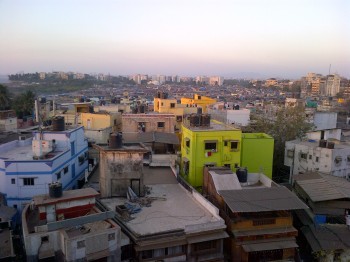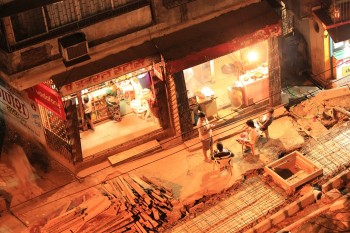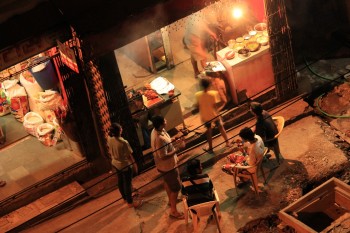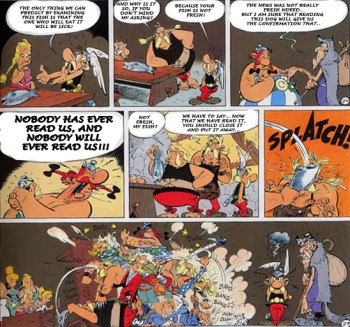10/02/2013
Why in India most people are vegetarian?
My mother gave me an idea. She was in a great shape during her last trip to India and asked me about a dozen of questions every minute: and why is this woman dressed like that and why is this guy doing this and why this and why that? A bit annoyed by the number of questions and even more because I didn’t have the answer, I started making up (stupid) answers, which she kinda believed….
And then I thought that if my mother asks herself these questions, maybe others do too! And here is a series of posts like Why are Indians vegetarian? Why do Indians worship the cow? Why do Indians eat with their fingers? Why do Indians have red marks on the forehead? Why do Sikhs wear turbans? etc.
Enjoy the reading!
Why are Indians vegetarians?
Even after seven years of being able to order chicken in most of the restaurants I have been to, I'm the first one to claim that Indians are vegetarians. Is it because I had never met one before?
Because as a matter of fact less than half of the Indian population is vegetarian! (1) Of course in numbers it is very high since one person out of 6 on this planet is Indian; consequently 70% of the vegetarians in this world live in India. (2)
The concept of the non-veg (non-vegetarian) versus veg (vegetarian) is quite peculiar here.
The pure veg, for instance, usually won’t drink alcohol. Do you see the link? I for one assume that if the pure veg is respectful enough of the rules to not eat meat he will also abide by by other rules, like regarding drinks…
Or when an Indian tells you he is a Brahmin, there are great chances (55%) he is veg, unless he is a Kashmiri Brahmin (they eat mutton) or a West Bengali one (they are fond of fish). (3)
Another example is how the pure non-veg will blow a fuse if you serve him a meal without meat or fish – it's completely inconceivable for him.
I just fell from the sky when my favorite ex-Indian almost cancelled our trip to Hampi when he discovered (at the last minute, of course) that it was a sacred place. And who says sacred – I discovered it that day – also says no meat and no alcohol! 
There is also the non-veg who, to clear his conscience, will deprive himself of meat on the special days of worship of his God (when he doesn’t fast completely). And there are other funny rules like when my Hindu colleague cannot eat garlic nor onion on Tuesdays, Hanuman’s day.
So how did Indians become veg?
There was a time (Vedic to be precise) when Brahmins (the priests), who today are the most ardent defenders of the sacred cow, practiced religious sacrifices of the said cow. But it was for its good: it was already revered at that time and it enabled the animal to move up faster in the reincarnation cycle. In the texts (particularly the Book of Manu) non-vegetarianism was quite framed: the killing of animals should be as part of a ritual sacrifice, only certain animals should be slaughtered and we could eat their meat only for a particular purpose. (4)
A few centuries BC, Lord Mahavir, a Hindu of blue blood, gave up all his belongings (including his clothes) at 30 and went meditating for twelve years. He came back with the Jainism doctrine and its principle of nonviolence which is quite extensive as it applies even to bacteria. Jains cannot eat meat, fish, egg, honey, onions and garlic (which arouse sexual desire), vegetables that grow in the ground (potatoes, carrots etc) nor fruits still on the tree.
Almost at the same time, the prince Gautama Buddha renounced his lifestyle at 29 and after six years of meditation in the forest, he stated the principles of Buddhism, including non-violence. History repeats itself... Except that Buddhists are slightly less stringent than Jains: it is not forbidden to eat meat but to kill the animal...
A few centuries later, as the Hindu Emperor Asoka was ruling on the largest empire that was ever built in India, he woke up one morning disgusted with all the violence caused by the wars and converted to Buddhism, enjoining his people to do the same. "No living being must be slaughtered or offered in sacrifice."
As Buddhism threatened Hinduism, Hindu priests bounced back and encouraged the practice of vegetarianism which thus spread. Cows began to prosper. One cannot say the same of Jains and Buddhists (which are now respectively 4 and 8 millions in India (5)). Pigs and goats also went through a flourishing era until the Muslims started coming in in the 8th century (6), some 9 centuries after India had turned veg (except for warriors and Kings- not crazy these ones! – and Untouchables who ate whatever they could find). (7)
Next we will see Why do Indians worship cows?
(1) 31% are pure vegetarian and 9% eat eggs. Source: http://hindu.com/2006/08/14/stories/2006081403771200.htm
(2) http://www.hendersonsofedinburgh.co.uk/vegetarianism-a-brief-history.php
(3) Lord Mahavir (599 B.C. - 527 b.c. Gautama Buddha (563 BC - 483 BC), King Asoka (304 B.C. - 232 B.C.) )http://www.indiacurry.com/faqhistory/hfaqbeef.html
(4) http://www.asian-recipe.com/india/food-culture-history.html
(5) http://censusindia.gov.in/Census_And_You/religion.aspx
(6) http://www.bbc.co.uk/religion/religions/islam/history/mughalempire_1.shtml
(7) http://www.thehindu.com/features/metroplus/society/a-matter-of-tastes/article5003956.ece
08:00 Posted in Why in India... | Permalink | Comments (0) | Tags: india, food, vegetarian, non-vegetarian, pure vegetarian, veg, non-veg, meat, cow, pig, fish, jain, buddhist, hindu, religion, buddha, nonviolence, asoka, sacrifice, holy cow, sacred cow | ![]() Facebook | |
Facebook | |
03/04/2013
Welcome in Khar, Mumbai
I managed to find a place a few days before flying back to Mumbai for good and after coming back, I quickly settled in. As you cannot have it all, I have an incredible view of the sea and the slums, a great ventilation in the apartment and no vis-a- vis. But I also have smells of fish drying coming from the adjacent fishing village (though to be honest it is not worse than anywhere else in Mumbai - see my post) and the noise of the rickhsaws that rattle all day long and the bells of temples of Hanuman that ring here and then. Incredible but true I have quite accommodated to the noise and smells. I just need to have a look through the window and be okay with everything...
I can even walk through the slum, reach the beach and walk up to my office – but only at low tide!
I just hope that the day where I will smell of dried fish someone will have the kindness to let me know...
I have Indian friends who are not so enthusiastic about my neighbourhood, to say the least. But I love the “popular” side of it, somewhere between a fishing village and a slum. There is not a day when nothing happens. Not need of TV, there is always something happening down the window.
The French bourgeois girl of a Paris fancy neighbourhood that watching Indians going to the public urinal at the bottom of her building makes ecstatic...!
08:00 Posted in Expatriation (in India and in other countries), My stories in India | Permalink | Comments (0) | Tags: india, mumbai, khar, fish | ![]() Facebook | |
Facebook | |
10/15/2011
Not fresh my fish??
It all started a few months after I arrived in Mumbai…
I had been hunting a rat in my flat, without success, when this horrid smell started. Shit, it must be dead in an impossible place to find!! I started looking anyway, without success again.
I then stepped out of my flat, only to realise that the whole neighbourhood smelled of dead rat!
To be accurate, of dead fish.
And here we are, 3 years later, when I finally decide to look into it. The thing that has “bothered” me the most is that this is not a constant smell. It will someday come, stay the whole day and then disappear. So I wondered why…
After some research, I think it depends on 2 things: 1. when the fishermen go fishing which is linked to the moon, 2. the way the wind blows when the fish is drying.
To go a bit into details:
08:00 Posted in Incredible India! | Permalink | Comments (0) | Tags: bombay duck, fish, dry fish, bangda, harpodon neherius, mumbai, india, fishing, peak season, drying, processing, name, koli, fishermen, purnima narial, unhygienix, asterix and the toothsayer, asterix and the great crossing, fishmonger | ![]() Facebook | |
Facebook | |



















